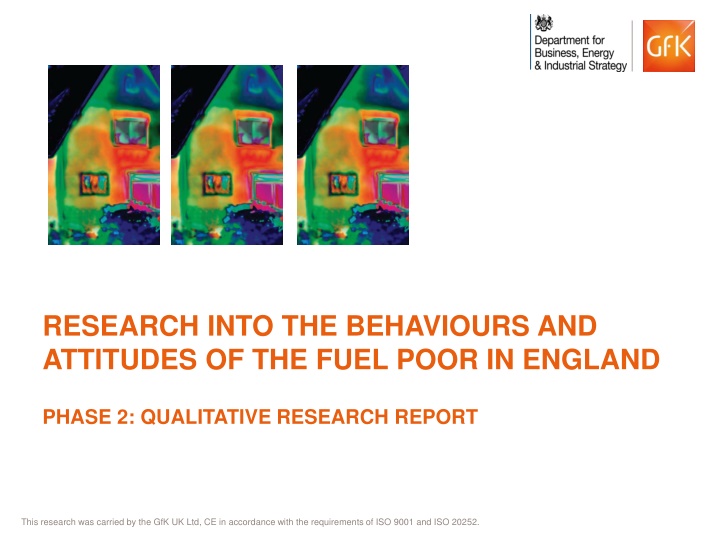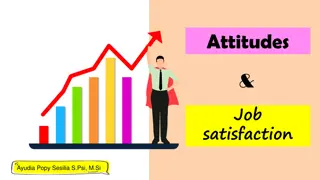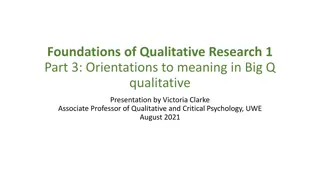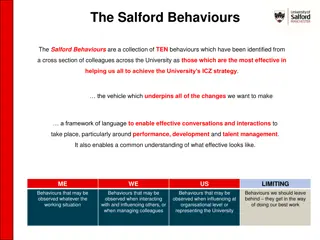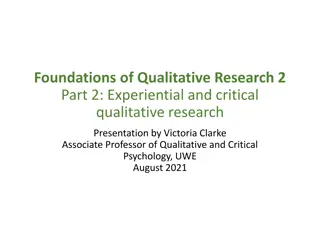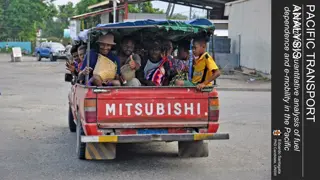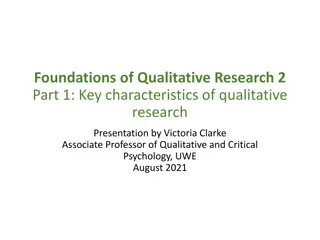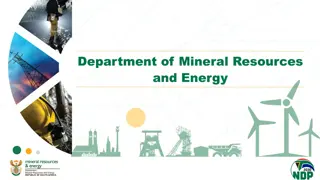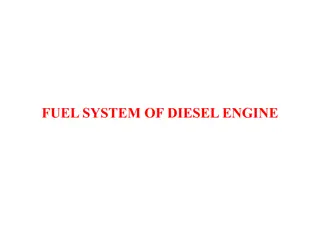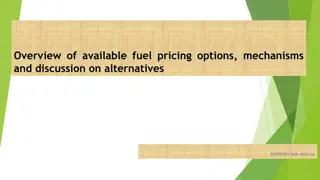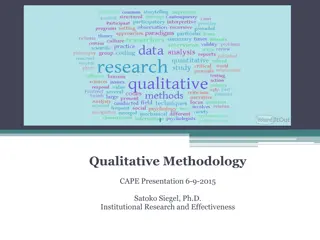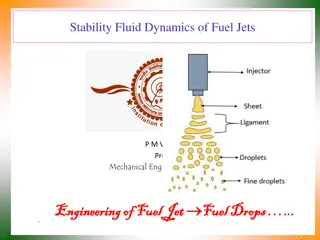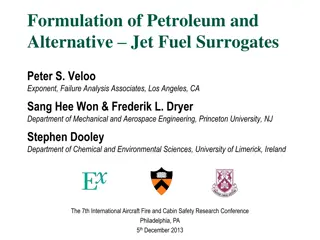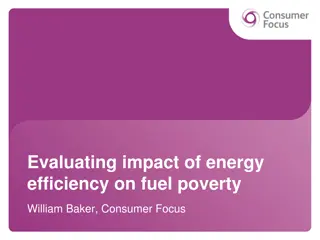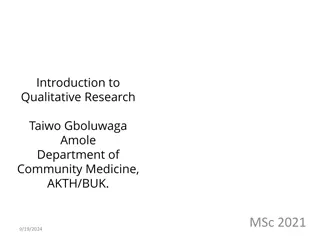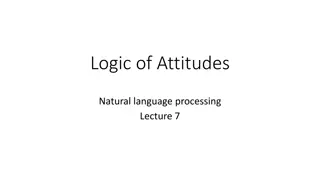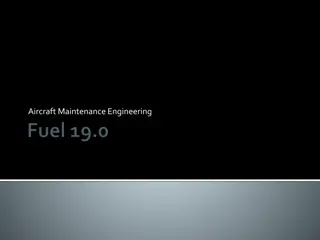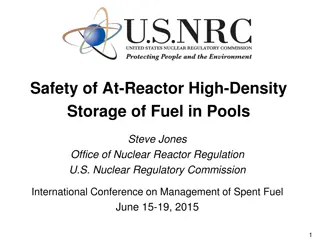Qualitative Research on Behaviours and Attitudes of Fuel Poor in England
The research conducted by GfK UK Ltd. delves into the behaviours and attitudes of the fuel poor in England, challenging preconceptions and exploring how they cope with fuel poverty, perceive energy efficiency, and could be encouraged to take up energy-saving measures. Through 50 in-depth interviews, the study reveals diverse circumstances of the fuel poor and sheds light on the complex interplay of financial pressures, coping strategies, and daily living challenges they face.
Download Presentation

Please find below an Image/Link to download the presentation.
The content on the website is provided AS IS for your information and personal use only. It may not be sold, licensed, or shared on other websites without obtaining consent from the author.If you encounter any issues during the download, it is possible that the publisher has removed the file from their server.
You are allowed to download the files provided on this website for personal or commercial use, subject to the condition that they are used lawfully. All files are the property of their respective owners.
The content on the website is provided AS IS for your information and personal use only. It may not be sold, licensed, or shared on other websites without obtaining consent from the author.
E N D
Presentation Transcript
RESEARCH INTO THE BEHAVIOURS AND ATTITUDES OF THE FUEL POOR IN ENGLAND PHASE 2: QUALITATIVE RESEARCH REPORT This research was carried by the GfK UK Ltd, CE in accordance with the requirements of ISO 9001 and ISO 20252. 1
Contents 1. Introduction 2. Who are the Fuel Poor? 3. How do they cope with Fuel Poverty? 4. How do the Fuel Poor feel about Energy Efficiency? 5. What would encourage the Fuel Poor to take up Measures? 6. What are the most effective channels to communicate with the Fuel Poor? 2
Method The research involved 50 case study in-depth interviews with the Fuel Poor, each lasting for 2 hours Living Energy usage circumstances Coping strategies Attitudes to measures Interviews conducted during February and March 2015 Preferred communication channels 4
Recruitment & sample Participant recruitment use a free-find method: potential participants meeting relevant criteria were selected from the general public within a specific local area. All participants were verified as Fuel Poor using an extended version of the proxy questions. Two-stage verification process: Reduced set of proxy questions asked at recruitment Full proxy questions asked during telephone back-check 1. 2. Quotas applied to the sample as a whole to ensure diverse range of Fuel Poor Locations: areas of high concentration of FP, covering a spread of regions Demographics: spread of age, family composition, ethnicity, claimant status Income & tenure: above and below income threshold, mix of tenure & transience Property type: mix of property age , size & type Main fuel type: a spread, including off-grid, includes those with and without a boiler 50 in-depth interviews 5
Preconceptions of Fuel Poverty were challenged Fuel Poor are living with a wide variety of circumstances, challenging assumptions: Relative affluence sits alongside evident poverty, with a combination of characteristics defining people as FP. For example: Asset rich on low incomes, measures already installed Poor living conditions & financial difficulty Higher incomes, off- grid, large property FP DO NOT SEE THEMSELVES AS IN DIFFICULTY Coping with the situation in which they find themselves Fuel bills seen as a difficulty faced by everyone 7
Pressurised daily living Financial pressures Anxiety about bills Transience Financial juggling Tenure Feeling cold Fear of the future Short- term horizons Salary cycles Temporary contracts Pressurised daily routines Personal crises 8
Short-term horizons Increased capacity to look to the longer-term for some groups: Longer horizons: Homeowners Higher incomes Slightly longer horizons: Social renters Monthly pay Short horizons: Private renters Transient Pre-payment meters Very pressurised lives Relevant skills, knowledge and capabilities can extend horizons 9
Case study examples Differing approaches to coping in a crisis highlight diversity within the FP population Recently divorced man, demanding work routine, Financial juggling is an established pattern. Describes himself as not very good with keeping money aside, sees how it goes month to month Because my electric s on a meter, so if that goes I ve got no lights. You can get away with not paying your gas for a month and just pay it double, but you can t get away with not paying your electricity. But I tend to try and pay them all anyway...You could do that [pay double next month] with Council Tax as well as gas, but I think Council Tax is generally more expensive than gas, and I think if I was not going to pay one I d pay the more expensive one, so if you re going to have to double up the next month you don t want to double up on an extra amount for no reason...If it [electricity] wasn t on a meter and I was really struggling I d probably buy me food. You know, it s more the fact that it s on a pre-payment meter, so once it runs out it s gone. And there s not a lot you can do without electricity. 3 generations of family living in old, off-grid home, owned by mother in law. Costly to heat, listed building, converted barn. Couple run B&B. Oil is used for main central heating, wood burner in addition, and electricity to top up heating in winter We try to keep some money aside, but our outgoings exceed our income, so we seem to have this situation every year where we find ourselves in debt again. We recently had to sell [husband] s TR6 (to pay off debts) but we had some money left over that we re going to give to my Dad. We won t therefore be able to dip into it, so if we do have an emergency we ll ask him. 10
HOW DO THEY EXPERIENCE FUEL POVERTY 11
Control behaviours & short-termism The need to exert control is seen through habits & routines surrounding household budgeting Preference for short- term payments: planning week-by-week, or continuous juggling Short-term gain preferred over long-term benefit Preference for a known quantity: prefer a finite manageable sum to an advantage over the longer term Priority placed on knowing where you are Avoidance of credit: negative past experiences of debt 12
Coping in a crisis Short-term solutions but rarely changing usage Paying the bill Plug any gaps with a quick, and sometimes inefficient, fix Electric heaters Put on a jumper Changes are small and superficial Switch to short-term payments Borrow money Approach the provider Changes in usage Only a major crisis had encouraged people to limit usage significantly. Not a trigger to longer-term change. 13
Experiencing Fuel Poverty Fuel Poor tend to say that they don t feel discomfort, but spend on energy as they wish: COLD Presence of children Personal tolerance Symbolic value placed on warmth Push Pull Higher financial priorities Symbolic value placed on consumption WARM Fuel Poor don t tend to significantly change or adapt their usage to respond to high bills Most are unwilling to experience additional discomfort or privation in order to reduce bills 14
Value placed on warmth Relationship with warmth is deep and symbolic SYMBOLISM ATTACHED TO BEING WARM Based in upbringing Emotionally loaded Linked to aspiration to a comfortable life Especially those with children COLD ASSOCIATED WITH DEPRIVATION Inability to make a home for children Feeling like a failure, defeated A few feel that they are strong enough to deal with feeling cold Significant financial sacrifices are made in order to feel warm 15
HOW DO THEY FEEL ABOUT ENERGY EFFICIENCY & ENERGY SAVING 16
Low understanding of energy use Fuel Poor are uncertain which appliances affect their bills, energy use is a black box . How can I change my energy use to reduce bills? Many misconceptions and ingrained habits Little concrete knowledge Sense of lacking the tools to know what to do Little understanding of precisely how bills are affected by varying usage Some scepticism that changes would make a difference Heavy focus on appliances Leads to a sense of fatalism Assume that not much that can be done to reduce bills Already doing everything possible 17
Low understanding of energy use I think it s very hard now, because it used to be quite straightforward...you had the television and da da da. Now you ve got all these things, you know, like you ve got a phone charging, you ve got an iPad charging, you ve got someone playing a game. So basically you could be sitting in there watching a DVD with the television and all the lights on and that s not the main source of electricity [usage], it s upstairs! Do you know what I mean? 18
Barriers to engaging with suppliers Fuel Poor do not generally understand their fuel bills, and fear increasing bills. This contributes to passivity & inertia Bills not read in detail Lack of understanding means that bills are not read Good customer service valued very highly Friendliness and approachability prevents switching Negative past experience leads to cynicism and avoiding contact Previous poor experience 19
Engagement in energy saving & energy efficiency Horizons have a strong impact on engagement and interest. Shorter horizons limit interest in far-off outcomes or major changes Longer horizons: Outcomes of reducing climate change are distant Most do not expect to be in their homes for the length of time needed to realise benefits of measures Medium-term horizons: Willingness to consider medium-term outcome, if specific, clear & easy to conceptualise Short horizons: Immediate financial benefit is required Specific problem resolution Homeowners Pensioners Social renters Higher incomes Tenants Lower incomes Transient 20
How do Fuel Poor feel about energy efficiency & energy saving? Fuel Poor frame these concepts in terms of money saving. Other aspects lack salience: Reducing energy use Feeling warmer Saving money on fuel bills Low salience Very little engagement with climate change & renewables: distant concepts for most Money saving in the short-medium term is the key benefit for all, other aspects are less motivating. 21
Mindsets in relation to energy saving & energy efficiency Reactive, shorter term horizons and high level of inertia can result in belief that there s little more they can do to influence their bills Already doing all they can: Ingrained habits & routines to save money - Tend to be poorly informed Safety in routine - Prefer to maintain habits unless there is a specific push Sceptical about the benefits of change: Will this mean changes in comfort levels? - Unwilling to make changes Not convinced of the likely benefits Benefits too long-term Resistance to change Mindsets represent a potential barrier to engaging with energy saving & energy efficiency 22
Successful engagement with energy saving & energy efficiency Fuel Poor are motivated to save money on their fuel bills, providing comfort is maintained. Examples were provided where engagement had been successful: Link to short-term, tangible benefit Energy saving lightbulbs Oil users more aware of usage, visible, finite resource Knowledge & information Enabling control behaviours Facilitate Fuel Poor to control usage Energy monitors Attractive financial offers Covering the cost Loft insulation Changes requiring little sacrifice in terms of comfort, habit & routine Adjusting hot water temperature to bath temperature No change to comfort Examples provided evidence that small changes have paved the way to wider changes 23
Engagement with measures Concept of energy efficiency measures in general was quite a leap for group, however there are differences in the degree of familiarity with measures Familiarity & comfort level Double glazing, loft insulation Well-known and understood Solid wall insulation, cavity wall insulation Some personal experience, or local examples to draw upon Renewables: biomass, solar, Little personal experience, except for TV dream home Low understanding and familiarity is a barrier to considering measures. Personal experience or local examples are key. 24
Engagement with energy saving: barriers Critical barriers exist for tenants and those in transient situations Some tenants have a low motivation to approach landlord: - Prefer not to rock the boat, or ask too much - Could lead to disadvantage Tenants CRITICAL BARRIERS Need for initial outlay is an absolute barrier for some: - Especially those on low incomes Financial situation Unwilling to make any investment of money, time or hassle - This applies to many private tenants, not just those who will move in the next year - Unwilling to invest in a property which isn t mine Transience 25
WHAT WOULD ENCOURAGE THE FUEL POOR TO TAKE UP MEASURES? 26
Overcoming key barriers Approaches to help counteract critical barriers Tenants: - Incentivisation of landlords - Supporting tenants to start a conversation with the landlord Financial: - Financial support - Full payment is particularly motivating - Free is an attractive concept Little interest in measures for those intending to move. 27
Supporting FP to reduce bills FP are motivated to reduce bills, approaches could support their existing efforts Supporting financial control & budgeting - Energy monitors potentially powerful tool to support understanding - Help people to develop a financial buffer or energy reserve Improving understanding - Support with understanding appliances - Improve knowledge generally of energy saving & energy efficiency Examples provided evidence that small changes have paved the way to wider changes 28
Matching initiatives with shorter horizons Shortening the length of time within which Fuel Poor are likely to see savings would improve motivation to take up measures: Highlight instant reassurance: E.g. rainy day fund, building an energy reserve Highlight instant benefits: E.g. warmth Enabling quick savings to be made: Within one month Homeowners Pensioners Social renters Higher incomes Tenants Lower incomes Transient 29
Capitalising on push factors Fuel Poor are more likely to make a major change if driven by circumstances Focus initiatives around key events: Key life events Transitions Repairs & improvements Home moving Ageing & ill- health 30
WHAT ARE THE MOST EFFECTIVE CHANNELS TO COMMUNICATE WITH THE FUEL POOR? 31
Communications journey Low awareness of energy saving & energy efficiency amongst Fuel Poor means a communications journey may be required for the least engaged. Several stages of communications may be required to support Fuel Poor to take up initiatives Enablement Creating urgency Trust & credibility Awareness 32
Building awareness Fuel Poor are engaged in the idea of saving money on energy bills, communications can build knowledge, understanding & knowhow Messages: - Small & simple steps can make a difference - You can save money immediately - You may be spending more than you need to - Financial outlay may be less than expected Channels - TV documentaries - Money saving websites & social media - PR, local newspapers Sources - Wider media Potential pitfalls - Targeting Fuel Poor could backfire: they don t self-identify - Expectation that help will be targeted at only at claimants 33
Building trust & credibility Fuel Poor need to be convinced that initiatives are bona fide and that claims are substantiated Messages - People like you have been able to benefit from initiatives - Bona fide scheme, government backed Channels - Local out reach & face to face support - Discussion with likeminded others: social media, neighbours Sources - Government - Local Council - Local community - Trusted messengers: Martin Lewis Potential pitfalls - Avoid doorstep selling - Mentions of credit agreements off- putting - Local outreach must protect privacy, talking about bills can be taboo 34
Creating urgency Fuel Poor require a push to overcome inertia and encourage change Messages - Opportunity to make a saving if you act now - This is the right time to consider an energy saving improvement or change in behaviour Channels - Relevant to life events and transitions: GP, HMRC - Support services such as CAB - Tradesmen provide valuable knowhow Potential pitfalls - Avoid stigmatizing language - Support services may seem intuitively not for me Sources - Relevant to key life events: GP, nursery, school - Home moving - Repairs: supplier information 35
Enablement Practical support & reassurance is needed to support Fuel Poor to make a major change Messages - Support is available to find a supplier - Someone local to you has done this and benefitted from it Channels - Any media that supports word of mouth testimony from real customers - Online reviews & discussion forums - Range of support levels: light to intense Potential pitfalls - There are some potential issues with trusting energy providers Sources - Credible brands: John Lewis - Council - Review sites for local suppliers 36
